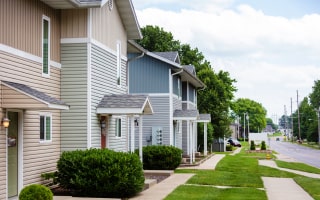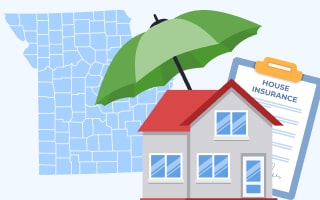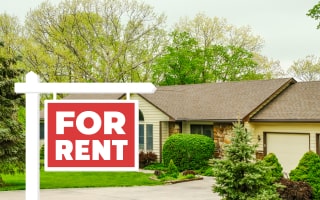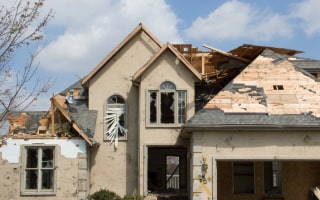Homeowners Insurance in Missouri

Known for its fantastic barbecue restaurants, Missouri is located in the Midwest, putting it directly in the path of a yearly flurry of tornadoes, earthquakes, and wildfires. Even one of these events in a year could cause devastating damage to property and homes. The more disasters, the more homeowners insurance claims. Since 1953, Missouri has had 69 federally declared disasters, and the rate of disaster per 1 million people is 11.1%.
Although most home insurance claims in Missouri involve natural disasters and severe weather, insurance providers also see claims for water damage caused by leaky or burst pipes or roofs. Other popular claims are fire, theft, vandalism, and liability.
No U.S. state requires homeowners to have any insurance coverage. However, all states insist that every homeowner needs some, especially in places like Missouri. If you take out a mortgage to buy a house in Missouri, your lender will require you to purchase homeowners insurance and keep specific levels active for the entire life of the loan.
As of August 2024, the national average for homeowners insurance is $2,511 annually. Residents in Missouri pay an average of $2,579 per year, which is slightly more than the national average.
Types of Homeowner Insurance Coverage Available in Missouri
Depending on where you live, you will have different insurance carriers to choose from and specific types of policies. Due to too many severe weather events, some providers refuse to offer insurance in some areas. The available types of home insurance in Missouri include:
-
Dwelling: Dwelling coverage protects the structure of your home (roof, walls, wiring, plumbing, floors, etc.) and pays to rebuild or repair your home after a qualifying event.
-
Other Structures: Insurance for other structures will pay to replace detached structures like fences, pools, sheds, garages, and hot tubs.
-
Liability Insurance: If someone gets hurt while on your property and they sue you, liability insurance will pay your legal bills up to a specific limit.
-
Medical Payments: If anyone is injured on your property in Missouri, medical payments insurance will pay their medical bills.
-
Personal Property Protection: This insurance will replace your personal belongings if they are destroyed or stolen after a qualifying event.
-
Additional Living Expenses (ALE): If your house is destroyed and must be rebuilt, ALE insurance will pay for your food, lodging, laundry, travel, and other expenses until you can return home.
Although Missouri does not sit on the coast, it does have lakes, rivers, and streams, and residents in some areas can experience flooding. Also, consider flood insurance.
FEMA (Federal Emergency Management Agency) manages the National Flood Insurance Program (NFIP) through a network of 50 providers across the U.S.
Since most homeowners insurance does not cover floods, this supplemental coverage can repair damage and replace items after a flood. Depending on the options you choose, it can cover the building and/or your personal belongings. This program is available to homeowners, renters, and businesses. Learn more about the program on FEMA's website.
Home Insurance and Natural Disasters
Unfortunately, natural disasters are becoming more commonplace across the U.S., even in historically "safe" areas. The more storms occur, the worse the situation is for the home insurance industry, which has been hit with massive claims and even more significant losses over the past few years. Climate change is the number one driver of insurance rates today.
For the past five years, homeowners insurance rates have spiked by an average of 34% and even as high as 60% in some areas. Some states have it worse than others. In Missouri, insurance rates have increased by 28.6%.
Missouri experiences tornadoes, earthquakes, wildfires, and other types of windstorms. In 2023, Missouri ranked #4 for the top hail events of the year. That same year, Missouri had 27 tornadoes that resulted in 5 deaths and a lot of property damage. In 2022, Missouri had 136 wildfires destroying 4,968 acres of land. From 1980 to 2024, Missouri had 11 billion-dollar disasters. The most expensive type of claim is fire, which costs insurers $77,340 per incident. Wind and hail damage (prevalent in Missouri) costs insurance providers $11,695 per claim. From 2015 to 2019, Missouri insurance carriers lost a total of $1,134,358,000.
How Can I Save on Homeowner Insurance Premiums in Missouri?
In states where homeowners insurance premiums continue to rise, residents struggle to find ways to save money on rates. The first step is understanding what impacts home insurance and how rates are determined. Some of the things that affect home insurance rates in Missouri include:
-
Location: Your location matters the most. If you live in a disaster-ridden state like Missouri, you will pay more than if you live in the Northeast, where there are rare disasters. Crime is also a factor. City dwellers pay higher home insurance rates than those in suburban and rural areas.
-
Age of the Home: The older the house, the more you will pay for insurance. New homes cost a lot less to insure.
-
Size of the Home: The larger the home, the more insurance you will pay because it will cost more to replace it.
-
Construction Materials: The construction materials used in a house also matter. If your home uses high-end products, your insurance will be costlier.
-
Coverage Levels: The more coverage you buy, the higher your rates will be. Balance what you need with what you can afford.
-
Your Deductible: The higher your deductible, the lower your rates and vice versa.
-
Your Credit Score: People with high credit scores earn lower rates than those with poor credit.
-
Claims History: If you have a long history of filing claims, you will pay more on home insurance.
-
Pets & Other Risks: Your insurance will be higher if you keep certain pets or have other "attractive nuisances".
-
Condition of Your Home: The better the condition, the lower your rates will be, and conversely, the poorer the condition, the higher your rates will be.
-
Financed or Owned: If you own your house outright, you can choose your own coverage levels and save money. If you finance your home, your lender will choose for you.
Some ways to save on home insurance in Missouri include:
- Avoid High Risks: Eliminate risky things from your home, like hot tubs, pools, and trampolines, and you could save on your insurance.
- Bundle Your Policies: Bundle multiple policies with the same carrier, and you can save on your rates.
- Reinforce Your Home: Install a stronger roof, windows, and storm shutters to lower your risk and save on homeowners insurance.
- Improve Your Credit: Improve your credit score and then ask your insurance agent to re-evaluate your rates.
- Raise Your Deductible: Raise your deductible as high as possible to save on your insurance rates.
- Improve Home Security: Install a high-end security system to protect your home against theft, vandalism, and fire and save money on your rates.
- Install Fire Safety: Install a sprinkler system, smoke alarms, and fire extinguishers to reduce fire risk and lower premiums.
- Don't File Small Claims: Hold off on filing small claims; wait for the big one to keep rates down.
- Ask for Discounts: Ask your insurance agent for eligible discounts.
- Shop Around: Shop around for a provider and compare rates.
Home Insurance Discounts in Missouri
Home insurance protects your home against covered events. Homeowners purchase policies, and the insurance pays to rebuild or repair their homes after a disaster. Every policy comes with limits and will only pay up to those limits. Some qualifying events include fire, smoke, falling trees, lightning, wind, hail, theft, and vandalism. These policies also include personal property protection, liability coverage, medical payments, and loss of use.
It's easy to purchase homeowners insurance. First, you need to pick a provider, then call their 800 number or apply online through their website. You could also find a local agent to help you determine the proper coverage for your situation. There are different types of policies, HO-1 up to HO-8, for different kinds of homes.
The most common discounts offered by most home insurance providers include:
- Early Quote Discount: Your insurance company may offer a discount if you get a quote well before you need it.
- Safety Discounts: Install security upgrades in your home, and your insurer may discount your rates.
- Claims-Free Discounts: Your insurer will reward you with lower rates if you remain claims-free for as long as possible.
- Bundling Discounts: Bundle your home and auto insurance together to get lower premiums.
- New Home Discounts: New homes cost far less to insure than older homes.
- Employee Discounts: Certain employees, like teachers or firefighters, get discounts on home insurance.
- Military/Vet Discounts: Most insurance firms give discounts to military personnel and veterans.
- Retiree Discounts: Senior citizens get discounts from many establishments, including insurance companies.
- Smart Home Discounts: Smart home equipment that monitors your home for water leaks, fire, smoke, and other perils could save you from filing claims and lower your rates.
- Payment Method Discount: If you opt-in for autopayments, you can save some money on your insurance premiums.
- Paperless Discount: Go paperless, and your insurance firm may give you a discount.
- Fire-Safety Discount: Install fire safety equipment like sprinklers, smoke alarms, and fire extinguishers to keep your home safer and lower your rates.
- Non-Smoker Discount: Non-smokers have a lower fire risk and get lower rates.
Common Rates Offer by Homeowners Insurance Firms
New construction homes cost far less to insure than older homes. New home buyers could save as much as 40%, and five-year-old homes often cost 26% less to insure. The average cost to insure a Missouri new home is $2,084 per year or $174 a month. However, actual rates will vary based on your customer profile (age, credit score, claims history, etc.).
Top 10 Home Insurance Firms in Missouri and Average New Home Savings
| Company | % savings |
|---|---|
| Nationwide | 76% |
| USAA | 54% |
| Allstate | 47% |
| Travelers | 63% |
| American Family | 55% |
| State Farm | 51% |
| Emcompass | N/A |
| Amica | N/A |
| Lemonade | N/A |
| Chubb | N/A |
Home Insurance and Renovations in Missouri

Home renovations can give your house a facelift and drastically improve your living conditions. However, they can also impact your home insurance premiums. Some upgrades reduce your risk and rates, and others increase them. Others do both simultaneously, effectively canceling each other out and un-affecting your rates completely.
![]() Home Renovations that Increase Rates
Home Renovations that Increase Rates
Some home renovations that increase your rates include:
- Building a Home Office: Adding a home office adds value and square footage and increases your rates. Home offices sometimes require special add-on insurance.
- Putting in a Hot Tub: Adding a hot tub can add hours of fun to your life and increase your rates.
- Solar Panels: Solar panels can help you save a lot on electricity, but they will increase your home insurance premiums.
![]() Home Renovations that Decrease Rates
Home Renovations that Decrease Rates
Some home renovations that decrease your rates include:
- Home Security System: Installing a home security system could keep your home safer and earn you lower insurance premiums.
- Shatterproof Windows: In a place that has frequent damaging windstorms, it's a good idea to install strong, shatterproof windows. Your insurance provider could discount your rates for it.
- Install a Sump Pump: A sump pump keeps your basement from flooding, and many carriers will lower your rates for being proactive and trying to avoid claims and water damage.
Replacing your siding could make your house much more resilient and able to weather storms better. It may also decrease your rates, but new siding could also raise them depending on the material.
When you choose to renovate your home and make upgrades, your homeowners insurance does not pay for those updates. Home insurance only pays to replace or repair your home after a qualifying event. Other things that home insurance does not cover are pest infestations, rodents, or damage caused by animals.
Before beginning any renovations, speak with your insurance agent. They can help you understand the impact they will have on your rates. You may need additional coverage after the renovation.
Missouri Renters' Insurance

Renters insurance is homeowners insurance for people renting houses, apartments, and condos. However, it differs from homeowners as it has no dwelling coverage. That must be covered under the owner's policy. Mostly, renters insurance pays to replace your personal belongings if they are destroyed by a qualifying event or stolen. Most renters policies also cover liability, medical payments, and loss of use (ALE). Some covered events include fire, smoke, lightning, windstorms, theft, and vandalism. Some things renters insurance will replace include:
-
Furniture
-
Clothing
-
Small Appliances
-
Bath Items
-
Bedding
-
Electronics
-
Sports Equipment
Insurance providers price renters insurance based on three main factors:
-
Location: Renters insurance in safer areas costs less. However, high crime and frequent disasters mean you will pay more.
-
Coverage Limits: The amount of coverage you choose will impact your rates. The higher the limits, the higher the premiums.
-
Number of Units: The more units in your building, the lower your rates.
The national average for renters insurance is $14.27 monthly. Renters in Missouri pay slightly less than that, $13.27 per month.
Condo Insurance in Missouri

Those who own condos need homeowners insurance, too. Condo insurance, or HO-6 insurance, is slightly different from homeowners insurance. The most significant difference is in the dwelling coverage, which only covers the interior (walls-in). This is because the condo association has a master policy to replace or repair the building if a covered peril destroys it. However, it will only restore it back to its original condition (when first built). That means outdated styles, colors, and materials. Most condo owners have upgraded flooring, appliances, kitchens, baths, and light fixtures. The HO-6 policy will restore the interior back to normal. Most condo insurance also includes personal property coverage, liability, and medical payments protection, loss of use, and loss assessment.
Unlike renters insurance, which has no dwelling coverage, condo insurance has limited (walls-in) dwelling coverage that will pay for appliances, heating, wiring, plumbing, interior walls, flooring, cabinets, countertops, lights, etc. Another difference is that with condo insurance, the liability portion only kicks in if the person is hurt inside the condo, not outside or on common grounds. That master policy will cover those injuries.
The average condo owner in Missouri pays about $485 a year or $40 a month for $60,000 of personal property coverage and $300,000 in liability, with a $1,000 deductible. It is cheaper for condo insurance than in many U.S. states. The national average is $625/year.
Some tips for saving on your condo insurance include:
- Bundle Your Policies
- Increase Your Deductible
- Improve Your Credit
- Shop Around for Rates
- Ask for Discounts
- File Claims Sparingly
- Improve Your Home Security
Missouri Home Insurance Market
The U.S. homeowners insurance industry is hemorrhaging money. Until 2023, the Missouri market remained stable, and insurers enjoyed regular annual profits. However, 11 separate billion-dollar disasters in 2023 (Texas and Georgia are the only two states that had more than that) caused enormous losses for insurance providers within the state. Due to global warming and significant climate change, there is an intense danger of this trend continuing into the future.
Missouri experiences many tornadoes each year, along with earthquakes and wildfires. These are some of the most devasting natural disasters that cause property damage. If this trend does continue, providers in the state may refuse to offer coverage in some areas, limit coverage, or cancel specific high-claims customers making it harder for residents to get the insurance they need.
Each state regulates the home insurance industry. The state appoints an agency or department to monitor providers and rates, investigate customer complaints, and sanction guilty firms. In Missouri, that agency is the Missouri Department of Insurance, located at 301 West, High Street, Room 630, PO Box 690, Jefferson City, MO, 65102.
Homeowners Insurance Guide
- Homeowners Insurance in Missouri
- Types of Homeowner Insurance Coverage Available in Missouri
- Home Insurance and Natural Disasters
- How Can I Save on Homeowner Insurance Premiums in Missouri?
- Home Insurance Discounts in Missouri
- Home Insurance and Renovations in Missouri
- Missouri Renters' Insurance
- Condo Insurance in Missouri
- Missouri Home Insurance Market
Instant Access to Missouri Property Records
- Owner(s)
- Deed Records
- Loans & Liens
- Values
- Taxes
- Building Permits
- Purchase History
- Property Details
- And More!
Homeowners Insurance Guide
- Homeowners Insurance in Missouri
- Types of Homeowner Insurance Coverage Available in Missouri
- Home Insurance and Natural Disasters
- How Can I Save on Homeowner Insurance Premiums in Missouri?
- Home Insurance Discounts in Missouri
- Home Insurance and Renovations in Missouri
- Missouri Renters' Insurance
- Condo Insurance in Missouri
- Missouri Home Insurance Market